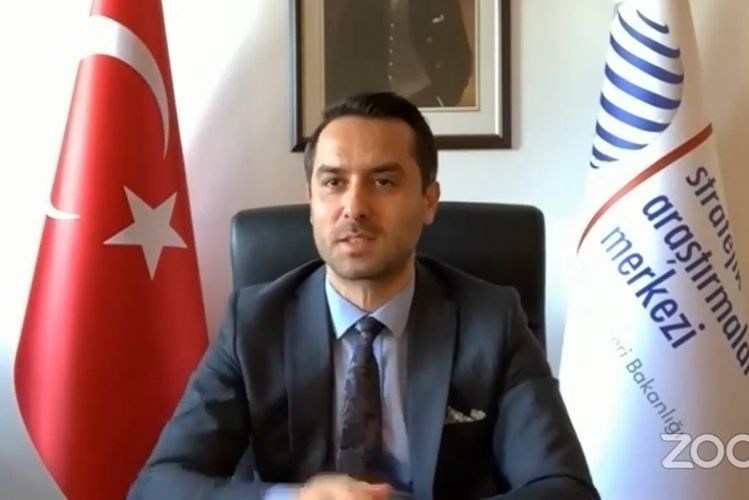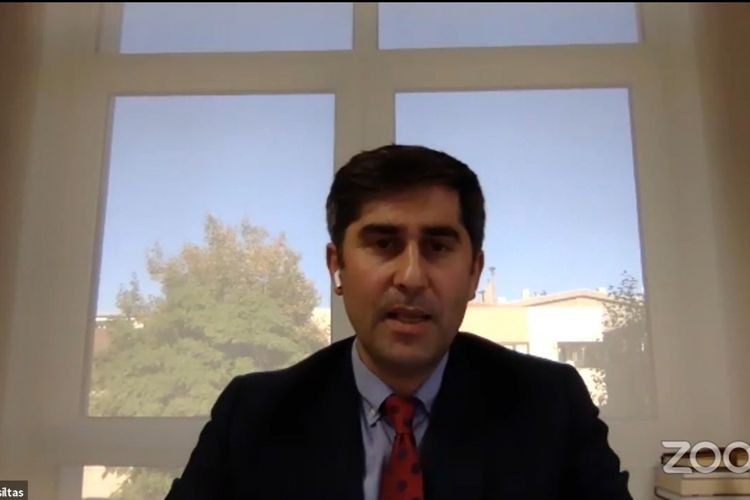On October 2, a webinar on the topic of “Nagorno-Karabakh and the future of Turkey-Azerbaijan relations” was held by the Center for Strategic Research of the Ministry of Foreign Affairs of the Republic of Turkey (SAM) jointly with the AIR Center.Deputy Foreign Minister of Turkey Yavuz Selim Kiran noted that Turkey was proud of Azerbaijan’s strong defense against the attack launched by Armenia on September 27 and its successful counter-offensive operations. He stated his full support of Azerbaijan’s position about the failure of the OSCE Minsk Group in the negotiation process and said that Turkey considers the same approach to the occupier and the occupier to be unacceptable. At the end of his speech, the Deputy Foreign Minister said that no one should doubt that Turkey’s unconditional support to Azerbaijan will continue. He called on Armenia to withdraw from the occupied territories and return it to its rightful owner.
Chairman of the SAM Center, Ufuk Ulutas, expressed confidence that international law stands by Azerbaijan and that cooperation between Turkey and Azerbaijan will lead to the liberation of the Karabakh region.
Farid Shafiyev, Chairman of the AIR Center, referred to four UN resolutions, the case of “Chiragov and Others v. Armenia” in the European Court of Human Rights and documents adopted by other international organizations, arguing that Armenia is recognized as an aggressor state under international law. Commenting on the calls of some major powers and organizations to suspend the ongoing military operations and resume peace talks, Farid Shafiyev said that Armenia’s refusal to implement the OSCE Minsk Group-led talks and the Madrid Principles under various pretexts and its attempts to change the format of the negotiation process to involve a third party, as well as setting seven conditions for the resumption of talks in July, have all made this impossible. He noted that currently, Azerbaijan is implementing its right of self-defense in accordance with Article 51 of the UN Charter. Further, Dr. Shafiyev added that by making claims on the territories intended by the Sevres Agreement, which carries no legal basis, the recent aggressive military rhetoric of Nikol Pashinyan has been not only against Azerbaijan but also against the Turkish state.
Director of the Security & Defense Research Program at the Center for Economics and Foreign Policy Studies (EDAM), Can Kasapoglu, speaking about the military aspects of the conflict, said that non-appliance of the principle of inviolability of internationally recognized borders to Armenia left Azerbaijan with no choice but to liberate its territories by military operations.He noted that the recent military partnership between Turkey and Azerbaijan has progressed from arms sales to the transfer of concepts and stressed the importance of training a joint generation of officers from the two countries.
Chairman of the Caucasian Center for International Relations and Strategic Studies (QAFSAM), Araz Aslanli, discussed the chronology of events that led to the suspension of the negotiation process, as well as Turkey-Azerbaijan relations and its possible impact on resolving the conflict.
Analyzing why the ongoing military operations began on September 27, Director of the SETA Foundation for Political, Economic and Social Research Murat Yesiltas said that it was organically linked to the July 12 Armenian attack on Tovuz, as well as geopolitical events in Libya, Syria and the Mediterranean region. Referring to Azerbaijan’s growing military power, he said: “The Azerbaijani army has already become an armed force that meets NATO standards.”







